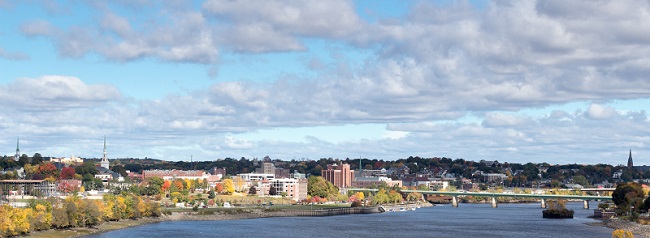History

Incorporated in 1791, Bangor is named for an Irish hymn entitled “Bangor,” said to be a favorite of pastor Seth Noble who traveled to Boston with the initial intention of naming the town Sunbury. Until recently, it was generally believed that the earliest record of European exploration was found in the journals of French explorer Samuel de Champlain. In 1604, Champlain established a short-lived colony on an island off the Maine coast and explored the Penobscot River to the head of tide at Bangor.
Fishing and fur trading drew early settlers to the coast of Maine. European interests in the New World also encouraged settlements. France colonized the area north and northeast of the Penobscot Valley, while more prosperous English colonies south of the area included the Massachusetts Bay colony. France’s defeat at the hands of the English on the Plains of Abraham in Quebec in 1759 consolidated English domination in what was to become the northeastern United States.
After 1759, much of today’s Eastern Maine became a province of Massachusetts, a situation that persisted until 1820 when Maine became an independent state. During the 19th Century, Maine’s vast forests, offering supplies of lumber and naval stores, brought unprecedented wealth to the region. By the 1850’s, Bangor was considered the lumber capital of the world, was one of the busiest ports on the East Coast, and was heavily engaged in shipbuilding and commerce. By the twentieth century, however, the shipbuilding industry had been transformed by the advent of the age of steam and steel, and Bangor’s sawmills and shipyards gave way to today’s dominant forest industry – pulp and paper.
Today, Bangor remains the commercial and social center of Northern, Central, and Eastern Maine. It has become the region’s largest center of retail and service businesses, and a center for government, education, and employment. Offering a widely diversified economy, Bangor has transcended its traditional roots in forest products and shipbuilding and today maintains its position as one of Maine’s major urban centers.